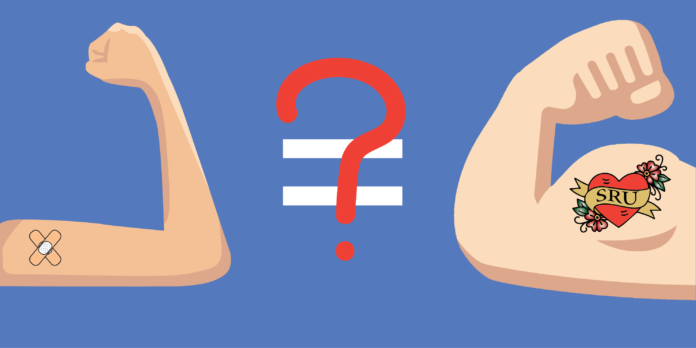Our View is a staff editorial produced collaboratively by the entire Rocket Staff. Any views expressed in the editorial are the opinions of the entire staff.
To review our editorial policy, which includes our blotter policy, click here.
The United States has been battling COVID-19 since Jan. 20, 2020, 641 days ago. It was officially declared a pandemic on March 11, 2020. Within this period, the country had to adapt to mask-wearing, social distancing, virtual job requirements and online classes, just to name a few. On Dec. 11, 2020, the FDA authorized the Pfizer-BioNTech COVID-19 vaccine for emergency use in the United States. Since the development of the vaccine, over 409 million doses have been administered in the United States, according to the Centers for Disease Control and Prevention (CDC).
Butler county’s vaccination rate is about 55% of the population, with roughly 103,000 people being fully vaccinated. But at SRU, as of Wednesday, the student vaccination rate is 52.5% of the campus population, according to Kristina Benkeser, director of student health services.
At this point in the pandemic, there are still some people who have reservations against the vaccine, with many different reasons as to why. But for those who are willing to receive it, there’s typically no cost, and most local pharmacies are offering walk-in appointments.
Universities across the United States are offering incentives for college students to get vaccinated. Some schools are offering scholarships, promising puppy therapy, giving out textbook credit, free parking and free tuition.
PASSHE vaccine incentives
While SRU has a vaccine incentive campaign, the same cannot be said for all schools in the Pennsylvania State System of Higher Education (PASSHE). Not all PASSHE universities are offering something of this kind.
Nine of the 14 PASSHE universities aren’t offering incentives for vaccination, including California, Cheyney, Clarion, East Stroudsburg, Edinboro, Indiana, Kutztown, Lock Haven, Mansfield and Millersville Universities, according to their university websites. However, Bloomsburg, Shippensburg, Slippery Rock and West Chester Universities are incentivizing vaccines, from offering scholarships to tattooing the university president.
Bloomsburg University held a scholarship drawing on Oct. 6 and about 3,700 students submitted proof of vaccination. The university rewarded 40 students with scholarships, including two $5,000 awards, 10 awards of $2,500 and 28 rewards of $25 in Husky Gold.
Shippensburg University is engaging its campus community in a vaccination week from Nov. 8 through Nov. 12. According to Kimberly Garris, vice president for external relations and communications at Shippensburg, the university hopes to acknowledge those who are vaccinated, increase submissions for proof of vaccination, offer vaccination opportunities and educational materials and offer a number of different incentives like scholarships.
West Chester University held four scholarship drawings for students since the beginning of the semester, according to Nancy Santos Gainer, assistant vice president of university communications and marketing. Students who uploaded vaccination proof between Aug. 16 and Aug. 30 were entered to win two $2,500 scholarships and one scholarship for $5,000. An additional $5,000 scholarship was added and a winner was selected on Sept. 10. Out of the more than 15,500 students, roughly 10,000 have indicated that they are vaccinated, or about 66% of the student population.
SRU’s Rock the Shot, Ink the President
The university launched the “Rock the Shot, Ink the President” campaign on Oct. 5 in an effort to encourage an increase in vaccination rates on campus. The campaign’s main incentives include prizes for undergraduate students and the possibility of SRU President William Behre getting an SRU-themed tattoo. No participant can win more than one prize.
If the student vaccination rate reaches 65% by Nov. 1, five students will be awarded a designated parking spot in a lot of their choosing, excluding staff lots, for the spring 2022 semester. If the rate reaches 70% by Nov. 17, one undergraduate student will receive free tuition for the spring 2022 semester. If the rate reaches 75% by Dec. 3, the president will receive an SRU-related student-designed tattoo on his upper arm.
The catch is that the campus vaccination rate has to reach at least 65% by Nov. 1 for students to receive any awards. Roughly two weeks into the campaign, the campus vaccination rate is only at 52.5%, with just 11 days until Nov. 1, the first incentive deadline. This is a 1.5% increase since the campaign started on Oct. 5.
At some point, we must ask ourselves if this is the best the university can offer. The campaign is certain to catch people’s and the media’s attention, but will it carry out its original goal to increase the student vaccination rate? SRU should continue to educate students on why being vaccinated is beneficial for the community, while also easing student worries and hesitations.
Student and community opinion of incentives
Despite some adverse reactions from the community, it did get students talking about the vaccine and the university’s mitigation efforts. Student and community discussions are not in favor of the incentives.
Most individuals are indifferent about the campaign. The incentives aren’t being taken seriously, as they aren’t necessarily areas of interest for the student body. Although the parking incentive may be popular with students, they would rather see a solution to the problem, rather than VIP access for such a select few. For the existing incentives, students know that their chances of winning any prize is low.
To advertise this plan, the university has posted on its social media platforms, displayed large posters around campus and posted flyers in buildings. While this is gaining a lot of traction, the lighthearted nature of its promotion has almost taken away from the credibility of the campaign as a whole. Its promotion on social media seems to undermine the university’s goals by spreading a joke-like image with a campaign about a topic with such serious implications.
As an image of President Behre wrestling COVID-19 circulated on Facebook, commenters mentioned how the meme seems to weaken the main idea of the incentives: to increase the student vaccination rate. With 17 total comments, SRU students, faculty and community members positively responded in the comment section of the post, including comments like, “That’s amazing!!”
However, most comments were critical, like “Bribing kids… disturbing,” “Embarrassing” and “Weird flex but ok.” Someone also asked who runs the university’s Facebook page. Alumni and donors also participated, explaining that they were disappointed in the university and will not be donating any more money to SRU.
On Thursday, the official Slippery Rock University Facebook page also posted a meme of the Harry Styles’s Fine Line album with President Behre’s face on Styles’s body.
Alternatives and solutions
Some of the most beneficial vaccine incentives came from the fully-vaccinated SRU Lacrosse Team, who were promised new shoes. Students also received $50 in flex money in the beginning of the semester for uploading proof of vaccination. The community seemingly had better reactions to these material incentives.
Currently, the incentives are so limited in quantity that students are uninterested because of the only slight possibility of winning. Incentives should benefit the entirety or at least the majority of students, so that students feel that they do have a chance to win if they’re vaccinated.
Had student voices been included in this incentive campaign, the university may have approached this from a different angle. Student voices can add depth and insight into the conversation on how to approach encouraging students to vaccination. In future mitigation efforts, we hope the university considers asking students for their input, as the students are directly affected by the incentives and those who choose to remain unvaccinated.
The university should take this time to reflect and better its campaign. If the university’s ultimate goal is to return to normal, which is what the incentives are trying to promote, it should be its number one priority. The vaccine is not a political issue. It’s a matter of a public health crisis, and it should be treated as such. The current incentives stray from the intended message, and instead turns the pandemic into a lighthearted issue.







